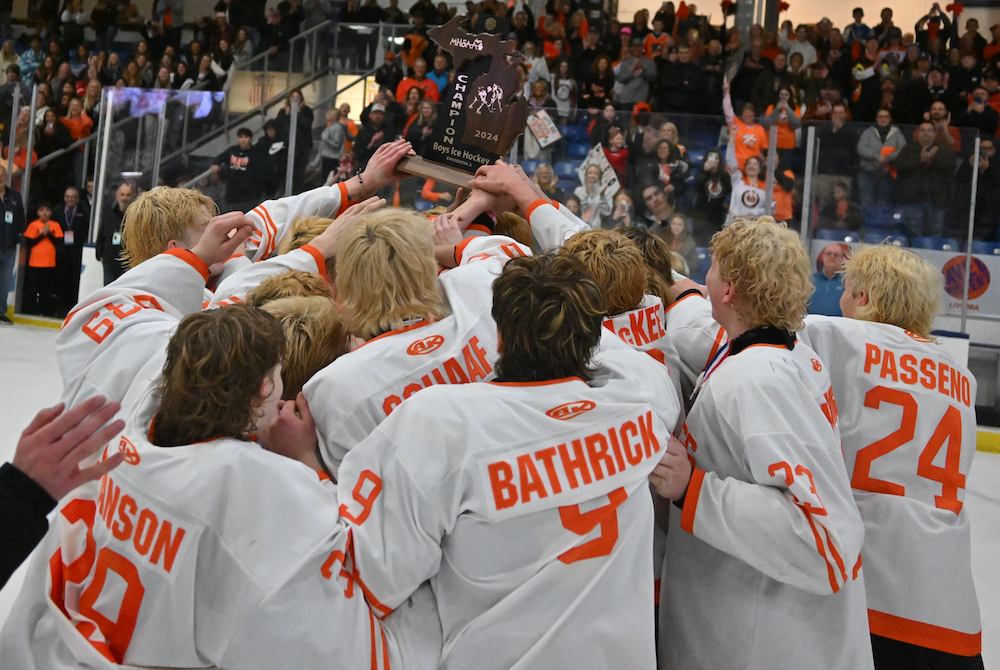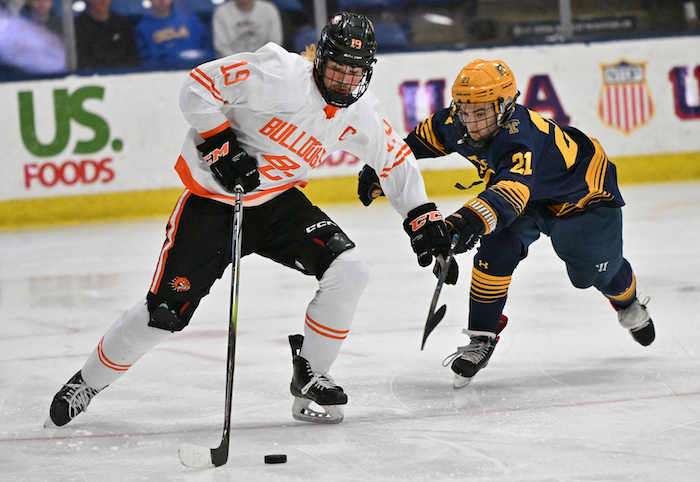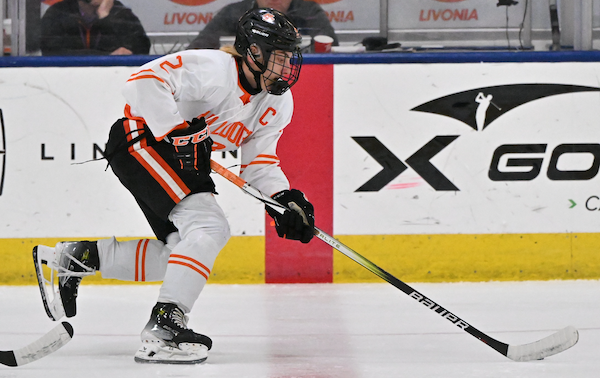
Officials Eager for New Hockey Format
July 12, 2019
By Rob Kaminski
MHSAA benchmarks editor
Tuesday, Feb. 26, was a particularly busy day on the ice as the 2019 MHSAA Ice Hockey Tournament reached just its second day around the state.
On the slate that night were 27 Regional games, bringing the two-day total to 48 on the heels of Monday’s busy calendar.
As teams were busy setting their sights on the ultimate goal, so, too, was another group of accomplished skaters who toil with much less fanfare. Nonetheless, the games can’t start without them – the folks in the striped shirts who call the games.
Just as players and coaches will welcome the expanded playoff format in 2020, the officials are looking forward to the change as well.
“When we got to the first week of the tournament, it seemed like we were going every day,” said Jim Gagleard, who assigns officials for the Livonia Ice Hockey Officials Association. “There are only so many officials to go around in any sport. By allowing us as officials a day or two to catch our breath, it’s good. Good for us, and good for players more than anything.”
If it seemed like every day, well, it was. A total of 66 games were played over the first three days, and 89 over the first four. Considering each game at the Regional level has three officials, that computes to 267 officials needed during that span. On the busiest day, 81 had to take to the ice.
Given that there were a total of 302 playoff-eligible officials in 2019, filling those slots can be a logistical nightmare for assigners at times.
“Regional week will see a huge burden alleviated for officials and especially assigners. There will be so much more flexibility under the new format,” said Dan DiCristofaro, President of the Northeast Hockey Referees Association. “Last year, we were faced with so many doubleheaders at single sites, and the first games needed an early start so that the second games would not last late into the evening on school nights.
“At times, the most important factor for the assigner was scheduling those officials who could get to the arena for the early start times. Merit and ability sometimes had to take a back seat.”
Gagleard agrees, saying, “Assigning-wise, early games are the toughest to fill. Everyone has a job, and in order to work a game they have to tell the boss they’re leaving at 2:30 for a 5 o’clock game. You start to look for officials who are retired, or can get out of work, instead of the most qualified. That’s not fair to the teams playing.”
In the northern reaches of the Upper Peninsula, the problem is more acute.
Sean Jacques is the athletic director at Calumet, and also an experienced official, having skated the Division 2 Final in Plymouth in 2016.
“Not enough,” Jacques said, in reference to the number of playoff officials in the UP. “Not enough. When I get the list of eligible officials that is sent to tournament managers, I have to search and scramble to find three people within an 80-mile radius.”
Moving the Quarterfinals to the weekend will definitely help matters, and eliminating Regional doubleheaders should ease the scheduling anxiety as well.
 “With Regionals spread out more, without doubleheaders, officials potentially could work more days,” Jacques said. “And there should be more availability for the Quarterfinals. The last few years, it was in the Sault, and getting four guys to the Sault on a weeknight, whether from Escanaba or northern lower Michigan, was difficult. There were times I’d turn down a Quarterfinal because I just couldn’t get there and back and make it to work the next day. Saturday makes it easier.”
“With Regionals spread out more, without doubleheaders, officials potentially could work more days,” Jacques said. “And there should be more availability for the Quarterfinals. The last few years, it was in the Sault, and getting four guys to the Sault on a weeknight, whether from Escanaba or northern lower Michigan, was difficult. There were times I’d turn down a Quarterfinal because I just couldn’t get there and back and make it to work the next day. Saturday makes it easier.”
On the west side of the Lower Peninsula, assigner Randy Sheahan uses a mathematical approach to illustrate his challenges, even for the regular season. Sheahan calculates that 98.88 percent of all West Michigan games are scheduled for Wednesday, Friday, or Saturday. Breaking it down further, 84.39 percent skip Wednesday and schedule only Friday or Saturday.
With the shortened regular season coming in 2019-20 to allow for a three-week tournament window, Sheahan took a proactive approach.
“When the MHSAA announced the change to a three-week tournament, I emailed all West Michigan coaches, plus a handful of athletic directors and booster leaders who may be involved in team scheduling,” Sheahan said. “I encouraged them if they are having difficulty squeezing all their games into a window which is now one week shorter, to give further consideration to playing on Mondays, Tuesdays, or Thursdays to greatly alleviate some of the stresses we place on the West Michigan officiating staff.”
As for the MHSAA Tournament, Sheahan agrees with his brethren across the state in metro Detroit that the expansion will benefit assigners, officials, and teams.
“I only see positives,” Sheahan said. “This gives me tremendous flexibility with our staff to maneuver around their professional and personal schedules to keep our best officials on the ice every round, which is an expectation teams have for playoffs. It also provides (at times) much needed rest for officials and teams, especially if they are involved in overtime affairs. This could help with the quality of overall game play.”
That’s the goal for everyone. Fresher legs for players and officials alike will provide a better experience for all involved.
“This allows for physical recovery for everyone on the ice,” said DiCristofaro. “It also allows for better time management for student-athletes, officials and coaches. Even at the Quarterfinal offerings with four officials for each game, we’d run into issues as far as which people could get to places, or wanted to travel and skate late on a work night. Saturday give us much more flexibility and should create more interest in the state tournament.”
The Quarterfinals, Semifinals and Finals have employed a four-official system in recent years, affording an extra position each game for deserving officials while adding to the quality of the game for participants at the highest level.
Sheahan plans to utilize the new format to continue to reward those among his troops who have earned their stripes for such contests.
“In theory, I may have opportunities to increase game counts for some of our perennial playoff officials, but I have no plans to do that,” Sheahan said. “We have other officials every season who are good enough to skate playoffs and have earned it, but simply couldn’t quite break the playoff bubble. Now the opportunity presents itself to reward some of those officials. It would be counterproductive to officiating development if fewer officials are getting opportunities for important games.”
Similarly, DiCristofaro is hoping the time will come when four officials will be assigned to skate Regional Finals, and perhaps the new length of the postseason will open the door.
“Some of most important games are the Regional Finals. Maybe this new schedule can help,” DiCristofaro said. “Four officials offer teams the best possible ice coverage, and they deserve that.”

Powered by Stars, Byron Center Writes Championship Chapter This Time
March 9, 2024
PLYMOUTH — This time, nobody was going to jam home a rebound with 6.7 seconds left to crush their dreams.
This time, there wasn’t a Peter Rosa around to don a Superman cape and score a third-period hat trick to rip a championship from their hands.
Byron Center had its own Superman this time, ensuring the Bulldogs wouldn’t be victims of another team’s storybook ending again.
Senior forward Jackson Froysland completed his hat trick 1 minute, 10 seconds into the third period to give Byron Center a four-goal cushion in a 6-1 victory over Trenton in the MHSAA Division 2 championship game Saturday at USA Hockey Arena.
Few teams have suffered the degree of multiple heartbreaking losses on the Finals stage as Byron Center.
In 2021, the Bulldogs lost 2-1 to Bloomfield Hills Brother Rice when Alec Hamady scored with 6.7 seconds left.
In 2023, Byron Center took a 2-0 lead into the third period. That’s when Rosa solidified his legacy at Brother Rice by scoring three goals in the Warriors’ 4-2 victory, a game in which Roman Villaire scored the game-winner with 4:42 left.
Knowing there would be no soul-crushing drama this time around, players on Byron Center’s bench began celebrating with 1:43 left in the game.
 “We’ve been thinking about that for a whole year,” Froysland said. “Coming into that locker room after the second period, we knew what they were going to come out and do. We countered that pretty well, I’d say.”
“We’ve been thinking about that for a whole year,” Froysland said. “Coming into that locker room after the second period, we knew what they were going to come out and do. We countered that pretty well, I’d say.”
Froysland has been as instrumental as any player in the rise of Byron Center’s co-op hockey program from its beginnings in 2016-17. Grand Rapids South Christian and Wayland also have students on the team.
With three goals and one assist against Trenton, Froysland finished his three-year career with 72 goals and 98 assists in 88 games.
Senior lineman Cade Pratt has been just as integral to the Bulldogs’ success. With two goals and two assists Saturday, he extended his points streak to 35 games going back to the final five games of last season. He finished this season with 34 goals and 54 assists in 30 games.
A year ago, Pratt’s goal in the first period gave Byron Center the 2-0 lead it carried into the third period against Brother Rice.
“Throughout the whole season, we’d touch on it here and there,” Pratt said. “When you go in 2-0 and lose, it burns you. Going into the third period of this game, it was a little reminiscent of that game. We knew what we had to do.”
After two near misses, the Bulldogs became only the third Grand Rapids-area team to win an MHSAA hockey championship. East Kentwood won Class A in 1990, and Grand Rapids Catholic Central captured Division 3 in 2011.
“I’m normally not lost for words after games, and I didn’t have a lot to say to these guys other than how much I love them as people, as hockey players, as teammates, as brothers,” Byron Center coach Jordan Steger said. “Then after I told them that, I got soaked in some water. Pretty much the postgame speech was cut off after that.”
 After a scoreless first period, Froysland scored the first two goals of the game by the 6:29 mark of the second.
After a scoreless first period, Froysland scored the first two goals of the game by the 6:29 mark of the second.
Trenton’s John Medvich cut the Bulldogs’ lead to 2-1 at 9:42 before Pratt scored twice in a 3:05 span to give Byron Center a 4-1 lead going into the third.
There would be no third-period heartache this time around.
Froysland picked up his hat trick during a two-man advantage 1:10 into the third, prompting a round of “Mr. Hockey” cheers from the Bulldogs’ student section. Braxton McKee extended the lead to 6-1 just 1:39 later.
“Coming in, everyone knew they had two candidates that are legitimate Mr. Hockey winners,” Trenton coach Chad Clements said. “Either one of them deserves it, as well as there’s some others out there, but those two especially on that top line; just tremendous hockey players.
“We tried to get the right matchups on the ice. They were matching up against us. It was cat and mouse, which was fun. They got some favorable matchup combinations against us. They scored a power-play goal that started everything. They’re dangerous. I thought we did a very good job of taking away time and space in the first period. Unfortunately, we were unable to (continue) that. That’s when the four goals happened.”
Trenton (23-5-2), which ranks third in MHSAA history with 14 Finals championships, was denied what would have been its first title since 2014. The Trojans have finished runner-up for times since winning 10 years ago.
“Wearing this jersey is something special,” Trenton senior captain Boston Bennett said. “It’s one of the best, if not the best, hockey communities in Michigan.”
Brady Swanson made 34 saves for Byron Center (27-2-1).
PHOTOS (Top) Byron Center raises its first Finals championship trophy Saturday after its Division 2 win over Trenton. (Middle) The Bulldogs’ Cade Pratt (19) maintains possession as Trenton’s Lucas Sawmiller (21) tries to reach the puck. (Below) Jackson Froysland carries the puck for the Bulldogs. (Photos by Hockey Weekly Action Photos.)

